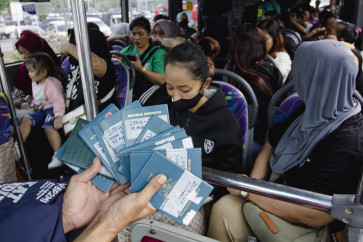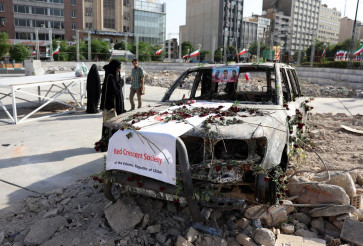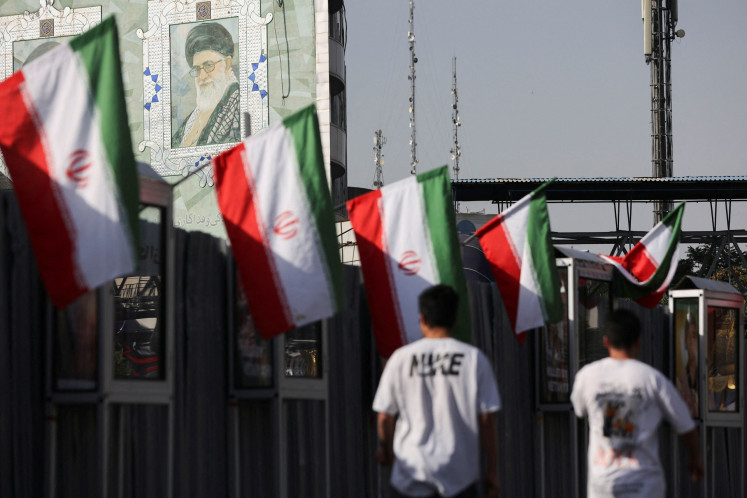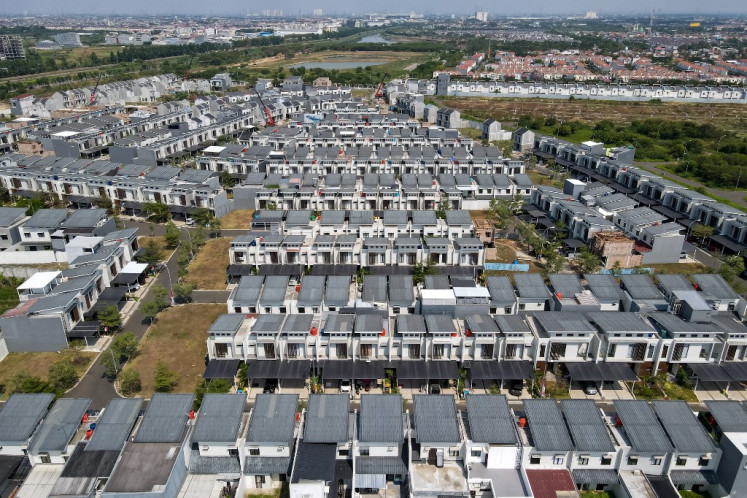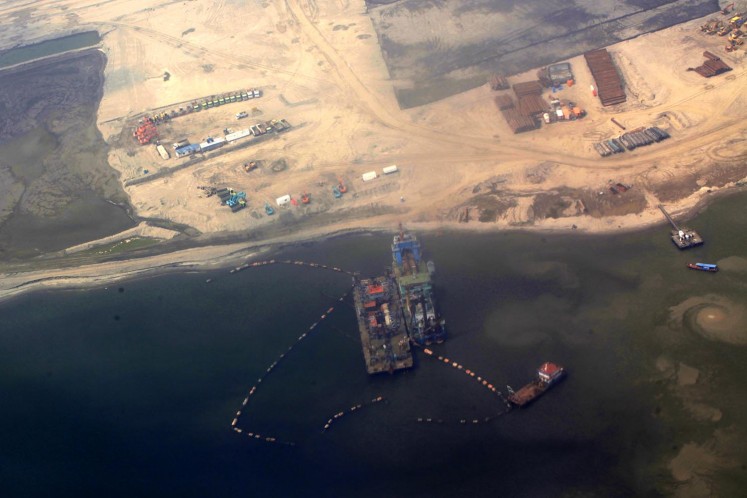Popular Reads
Top Results
Can't find what you're looking for?
View all search resultsPopular Reads
Top Results
Can't find what you're looking for?
View all search resultsLRT to begin commercial operations this month, expansions planned
Pedestrian friendly: Commuters walk through a special corridor under an LRT track on Jl
Change text size
Gift Premium Articles
to Anyone

P
edestrian friendly: Commuters walk through a special corridor under an LRT track on Jl. Rasuna Said in South Jakarta on Sunday. The first line of the Jakarta LRT network, spanning 5.8 kilometers from Kelapa Gading in North Jakarta to Rawamangun, East Jakarta, is expected to begin commercial operations in November.(JP/Rafaela Chandra)
The first line of Jakarta’s LRT network, spanning 5.8 kilometers from Kelapa Gading in North Jakarta to the Jakarta International Velodrome in Rawamangun, East Jakarta, is expected to begin commercial operations this month after long delays, officials have said.
“We hope [commercial operations will begin] mid-November, as we’re only waiting for one more prerequisite,” city-owned LRT operator PT LRT Jakarta acting president director Wijanarko told The Jakarta Post on Tuesday, adding that an infrastructure permit was still being processed by the Public Works and Housing Ministry.
Jakarta Transportation Agency head Syafrin Liputo echoed Wijanarko’s statement, saying the administration expected to the LRT line to commence commercial operations next month.
“We are in communication with the central government about accelerating [the project],” he told the Post.
The city administration previously aimed to open the LRT in time for the 2018 Asian Games to connect venues in Kelapa Gading with the Jakarta International Velodrome.
However, the line was not fully completed until after the quadrennial sporting event ended on Sept. 2, last year.
The firm claimed to have completed the physical infrastructure in May and the line has been open for a public trial since June 11. The trial runs from 5:30 a.m. until 11 p.m. every day with a headway of 10 minutes.
Wijanarko said the LRT’s operating expenses during the four-month trial were still being calculated.
“We are calculating [operating expenses]. Some aspects may still be under warranty, thus there will be no expenses if troubles occur,” he said.
While waiting for the prerequisite documents to be completed, the firm is seeking to integrate the LRT with other modes of public transportation such as Transjakarta buses and public minivans under the Jak Lingko scheme, as well as providing bicycle racks at LRT stations.
City owned developer PT Jakarta Propertindo (Jakpro) project director for the LRT Jakarta Iwan Takwim defended the decision to conduct an extended trial run, saying the LRT operator had been able to improve its services based on passenger surveys.
“There are expenses, but this way we can be properly prepared for commercial operations,” he said.
The LRT fare has been set at Rp 5,000 (35 US cents), as stipulated in Gubernatorial Decree No. 34/2019 on MRT and LRT ticket prices.
The administration is also looking at proposals to expand the LRT network.
The Jakarta Transportation Agency has made a proposal to the City Council for Rp 556.8 billion for the development of a fully elevated 19.7 km LRT line between Pulogadung in East Jakarta and Kebayoran Lama in South Jakarta.
The administration is also seeking to cooperate with the private sector under a government-to-business cooperation (KPBU) scheme.
“There is already sufficient public transportation connecting the city’s north and south. We need to strengthen the east-west connection,” Syafrin said. “The demand and economic aspects justify the construction of an [east-west line] LRT line.”
He also argued that the Transjakarta bus system had reached its optimal state.
“[Transjakarta’s] ridership has remained stagnant, so we have even had to encourage the expansion of the odd-even traffic policy,” he said.
Syafrin highlighted that the number of trips in Greater Jakarta had doubled from 47.5 million trips a day in 2010 to 88 million in 2018, according to the second phase of the Greater Jakarta Urban Transportation Policy Integration (JUTPI) study.
“If we don’t do something with the transportation system, Jakarta will collapse. How can we boost the economy if we don’t facilitate people’s mobility adequately?” he asked.
The LRT corridor will pass through Pulomas, Kelapa Gading, Jl. Perintis Kemerdekaan, Jl. Letjen Suprapto, Jl. Stasiun Senen, Tanah Abang and Kebayoran Lama.
It will be integrated with other rail-based transportation, such as the Kelapa Gading-Velodrome LRT line at Pulomas station and the Greater Jakarta LRT line from Cawang, East Jakarta, to Dukuh Atas, Central Jakarta, at Dukuh Atas station.
The Pulogadung-Kebayoran Lama LRT line will be part of the city’s planned 116 km LRT network, which is expected to be completed by 2030.
Earlier this year, Jakarta Governor Anies Baswedan and President Joko “Jokowi” Widodo committed to realizing massive infrastructure projects costing Rp 571 trillion, which include the development of the 116 km LRT network, a 223 km MRT network, a 2,194 km Transjakarta network, a 27 km elevated loop line train network, and the revitalization of public minivans.
Following the commercial operation of the Kelapa Gading-Velodrome line, Jakpro will continue the second phase of route next year.
The firm proposed a capital injection of Rp 1.68 trillion for phase 2A, which will span 7.5 km from Kelapa Gading to Sunter Agung, North Jakarta. The project is expected to be completed in 2022.
The capital injection will also be used to finish a study on phase 2B, which is planned to run 6 km from Velodrome to Manggarai, South Jakarta. Construction is expected to begin in 2021 and be completed by 2024.
The second phase projects are part of the planned 40 km LRT loop line that will serve Manggarai, Dukuh Atas, Tanah Abang, Sunter Agung and Kelapa Gading.
City councillor Nur Afni Sajim from the Democratic Party said during a deliberation of city’s budget priorities for next year at the City Council that plans for LRT development needed to be properly reviewed.
“Because we know the proposed budget sometimes does not align with the implementation,” she said, referring to the long delays before the commercial operation of the Kelapa Gading-Velodrome line.


